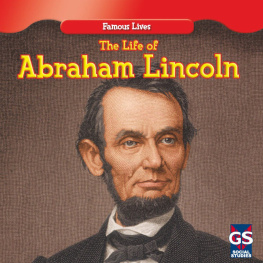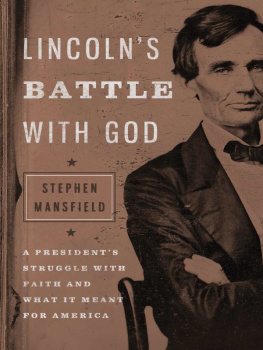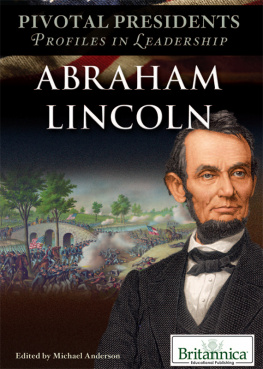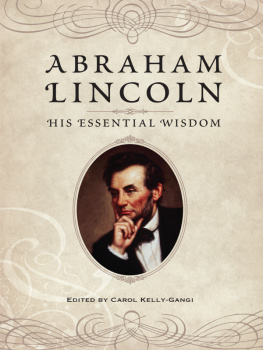The Early Life of Abraham Lincoln
Ida M. Tarbell
Ida M. Tarbell 1896
Ida M. Tarbell has asserted her rights under the Copyright, Design and Patents Act, 1988, to be identified as the author of this work.
First published in 1896 by S. S. McClure
This edition published in 2018 by Endeavour Media Ltd.
Table of Contents
Introduction.
It has been only within the last ten years that the descent of Abraham Lincoln from the Lincolns of Hingham, Massachusetts, has been established with any degree of certainty. The satisfactory proof of his lineage is a matter of great importance. In a way it explains Lincoln. It shows that he came of a family endowed with the spirit of adventure, of daring, of patriotism, and of thrift; that his ancestors were men who for nearly two hundred years before he was born were active and well-to-do citizens of Massachusetts, New Jersey, Pennsylvania, or Virginia, men who everywhere played their parts well. Abraham Lincoln was but the flowering of generations of upright, honourable men.
The first we learn of the Lincolns in this country is between the years 1635 and 1645, when there came to the town of Hingham, Massachusetts, from the west of England, eight men of that name. Three of these, Samuel, Daniel, and Thomas, were brothers. Their relationship, if any, to the other Lincolns who came over from the same part of the country at about the same time is not clear. Two of these men, Daniel and Thomas, died without heirs; but Samuel left a large family, including four sons. Among the descendants of Samuel Lincolns sons were many good citizens and prominent public officers. One was a member of the Boston Tea Party, and served as a captain of artillery in the War of the Revolution. Others were privates in that war. Three served on the brig Hazard during the Revolution. Levi Lincoln, a great-great-grandson of Samuel, born in Hingham in 1749, and graduated from Harvard, was one of the minute-men at Cambridge immediately after the battle of Lexington, a delegate to the convention in Cambridge for framing a State Constitution, and in 1781 was elected to the Continental Congress, but declined to serve. He was a member of the House of Representatives and of the Senate of Massachusetts, and was appointed Attorney-General of the United States by Jefferson; for a few months preceding the arrival of Madison he was Secretary of State, and in 1807 he was elected Lieutenant-Governor of Massachusetts. In 1811 he was appointed Associate Justice of the United States Supreme Court by President Madison, an office which he declined. From the close of the Revolutionary War he was considered the head of the Massachusetts bar.
His eldest son, Levi Lincoln, born in 1782, had also an honourable public career. He was a Harvard graduate, became Governor of the State of Massachusetts, and held other important public offices. He received the degree of LL.D. in 1824 from Williams College, and from Harvard in 1826.
Another son of Levi Lincoln, Enoch Lincoln, served in Congress from 1818 to 1826. He became Governor of Maine in 1827, holding the position until his death in 1829. Enoch Lincoln was a writer of more than ordinary ability.
The fourth son of Samuel Lincoln was called Mordecai (President Lincoln descended from him, being his great-great-great-grandson). Mordecai Lincoln was a rich blacksmith, as an iron-worker was called in those days, and the proprietor of numerous iron-works, saw-mills, and grist-mills, which with a goodly amount of money he distributed at his death among his children and grandchildren. Two of his children, Mordecai and Abraham, did not remain in Massachusetts, but removed to New Jersey, and thence to Pennsylvania, where both became rich, and dying, left fine estates to their children. Their descendants in Pennsylvania have continued to this day to be well-to-do people, some of them having taken prominent positions in public affairs. Abraham Lincoln, of Berks County, who was born in 1736 and died in 1806, filled many public offices, being a member of the General Assembly of Pennsylvania, of the State Convention of 1787, and of the State Constitutional Convention in 1790.
One of the sons of this second Mordecai, John (the great-grandfather of President Lincoln), received from his father three hundred acres of land, lying in the Jerseys. But evidently he did not care to cultivate his inheritance, for about 1758 he removed to Virginia. Virginia John, as this member of the family was called, had five sons, all of whom he established well. One of these sons, Jacob, entered the Revolutionary Army and served as a lieutenant at Yorktown.
The settlers of western Virginia were all in those days more or less under the fascination of the adventurous spirit which was opening up the West, and three of Virginia Johns sons decided to try their fortunes in the new country. One went to Tennessee, two to Kentucky. The first to go to Kentucky was Abraham (the grandfather of the President). He was already a well-to-do man when he decided to leave Virginia, for he sold his estate for some seventeen thousand dollars. A portion of this money he invested in land-office treasury warrants.
On emigrating to Kentucky he bought one thousand seven hundred acres of land. But almost at the beginning of his life in the new country, while still a comparatively young man, he was slain by the Indians. His estate seems to have been inherited by his eldest son, Mordecai, who afterward became prominent in the State; was a great Indian fighter, a famous story-teller, and, according to the traditions of his descendants, a member of the Kentucky legislature. This last item we have not, however, been able to verify. We have had the fullest collection of journals of the Kentucky legislature which exists, that of Dr. R. T. Durrett of Louisville, Kentucky, carefully searched, but no mention has been found in them of Mordecai Lincoln.
It is with the brother of Mordecai, the youngest son of the pioneer Abraham, we have to do, a boy who was left an orphan at ten years of age, and who in that rude time had to depend upon his own exertions. We find from newly discovered documents that he was the owner of a farm at twenty-five years of age, and from the contemporary evidence that he was a very good carpenter; from a document we have discovered in Kentucky we learn that he was even appointed a road surveyor, in 1816. We have found his Bible, a very expensive book at that time; we have also found that he had credit, and was able to purchase on credit a pair of suspenders costing one dollar and fifty cents, and we have learned from the recollections of Christopher Columbus Graham that in marrying the niece of his employer he secured a very good wife. The second child of Thomas Lincoln was Abraham Lincoln, who became the sixteenth President of the United States and the foremost man of his age.
The career of Abraham Lincoln is more easily understood in view of his ancestry. The story of his life, which is here told more fully and consecutively, and in many points, both minor and important, we believe more exactly than ever before, bears out our belief that Abraham Lincoln inherited from his ancestry traits and qualities of mind which made him a remarkable child and a young man of unusual promise and power. So far from his later career being unaccounted for in his origin and early history, it is as fully accounted for as in the case of any man.
So far as possible, the statements in this work are based on original documents. This explains why in several cases the dates differ from those commonly accepted. Thus the year of the death of the grandfather of Abraham Lincoln is made 1788, instead of 1784, because of the recently discovered inventory of his estate. The impression given of Thomas Lincoln is different from that of other biographies, because we believe the new documents we have found and the new contemporary evidence we have unearthed, justify us in it. We have not made it a sign of shiftlessness that Thomas Lincoln dwelt in a log cabin at a date when there was scarcely anything else in the State.











